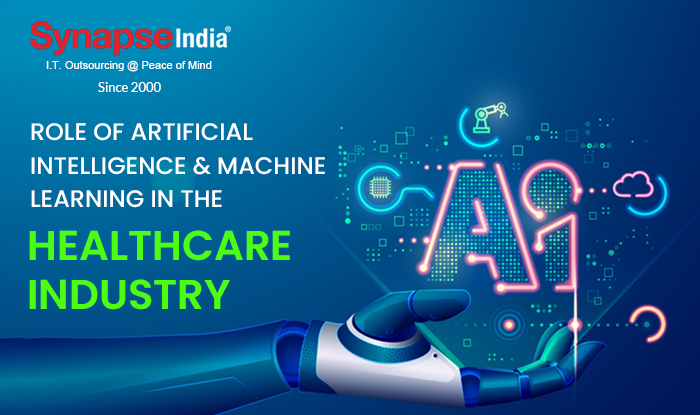 08 Nov 2022
08 Nov 2022“Artificial intelligence and machine learning are transforming the healthcare sector, implementation of AI and ML in the medical industry has upgraded the disease diagnosis process and illuminated the therapy plans.”

Essential time and colossal amounts of resources are lost consistently in the world of medical services frameworks. Misdiagnoses cost superfluous extra tests, result in deferred treatment designs and reduced survival or reduction rates from what might have happened had it been caught and recognized accurately before. Preliminaries, medicines, and research completed in silos so there's no utilizing the insights across the country or the world.
Big data and artificial intelligence in healthcare are teaming up and attempting to change our ongoing reality by trying different things. PCs and the algorithms they run can clean colossal amounts of information a lot quicker and more precisely than human researchers or clinical experts to uncover examples and forecasts to upgrade disease diagnosis, illuminate therapy plans and improve public health and security.
AI is utilized as a device for case emergencies. It upholds a clinician surveying images and scans. This empowers radiologists or cardiologists to distinguish fundamental insights for focusing on critical cases, to stay away from potential mistakes in reading electronic health records (EHRs) and to establish more precise diagnoses.
A clinical report can bring about colossal measures of information and images that should be checked. AI algorithms can examine these datasets at high velocity and compare them with different studies to distinguish designs and out-of-sight interconnections. The process helps professionals to track crucial data rapidly.
Supercomputers have been utilized to anticipate from databases of sub-atomic structures which potential medications would and wouldn't be compelling for different illnesses. By utilizing convolutional neural networks, an innovation like the one that makes vehicles drive without anyone else, Atom Net had the option to foresee the binding of little particles to proteins by analyzing hints from a large number of exploratory measurements and great many protein structures.
This cycle empowered convolutional neural networks to distinguish a protected and viable drug candidate from the database searched, reducing the expense of developing medication.
Clinicians frequently struggle to remain updated with the most recent medical advances while giving quality patient-focused care because of huge amounts of health data and clinical records. EHRs and biomedical data organized by clinical units and professionals can be immediately scanned by ML technologies to give quick, reliable answers to clinicians.
As a rule, health data and clinical records of patients are stored as convoluted unstructured information, which makes it challenging to decipher and access. AI can look for, gather, store and normalize clinical information no matter what the format, assisting repetitive tasks and supporting clinicians with quick, exact, customized treatment plans and medication for their patients as opposed to being covered under the weight of searching, identifying, collecting and transcribing the solutions they need from piles of paper formatted EHRs.
During an unexpected case of heart attack, the time between the emergency call to the ambulance arrival is critical for recuperation. For an expanded opportunity of survival, crisis dispatchers should be able to notice the symptoms of cardiac arrest so that necessary steps could be taken. Artificial intelligence can dissect both verbal and nonverbal signs to establish a diagnostic from a distance.
Corti is an AI device that helps emergency medicine staff. By examining the voice of the guest, background noise and significant information from clinical history of the patient, Corti alerts crisis staff in the event that it detects a heart attack.
At times, radiation treatment can lack a digital database to collect and organize EHRs, which makes the exploration and therapy of cancer troublesome. To help clinicians to pursue informed choices with respect to radiation treatment for cancer patients, Oncora Medical provides a platform that gathers the important clinical information of patients, assesses the nature of care provided, optimizes treatments and provides thorough oncology outcomes, data and imaging.
Automatic generation of clinical notes coordinated with EHRs prompted a decrease of time spent by clinicians in managing patient documentation, which works on clinical tasks and health outcomes.
Moving EHRs toward an AI-driven predictive tool permits clinicians to be more viable with their work processes, medical choices, and treatment plan. NLP and ML can read the whole clinical history of a patient progressively, interface it with side effects, chronic affections or a disease that influences other members of the family. They can transform the outcome into a predictive analytics tool that can catch and treat an infection before it becomes dangerous.
Artificial intelligence is likewise used to help quickly discover and foster medication, with a high pace of progress. Genetic diseases are leaned toward by altered molecular phenotypes, for example, protein binding. Anticipating these modifications implies predicting the probability of genetic diseases emerging. This is conceivable by collecting information on all recognized compounds and on biomarkers relevant to specific clinical trials.
The AI and ML industry has the obligation to plan healthcare systems and tools that guarantee decency and equality are met, both in data science and in clinical examinations, to deliver the most ideal health outcomes. With more utilization of ML algorithms in different areas of medication, the risk of health inequities can happen.
Those liable for applying AI in medical care should guarantee AI algorithms are exact, objective, and fair. Since numerous clinical preliminary rules and indicative tests consider a patient's race and nationality that a discussion has emerged:
Is the determination of these variables evidence based? Is race and identity data bound to tackle or to increment widespread health disparities? It is laid out that ML includes a bunch of techniques that empower computers to learn from the data they process. That intends on a fundamental level, ML can give unbiased predictions dependent just upon the unbiased analysis of the underlying data.
AI and ML algorithms can be taught to diminish or eliminate bias by promoting data transparency and variety for lessening health imbalances. Medical services research in AI and ML can possibly wipe out health-outcome differences in view of race, identity, or gender.
Artificial intelligence in medicine impact factor in health care and keeps on resolving difficulties, for example, absence of confidence in the outcomes conveyed by a ML framework and the need to meet explicit necessities. In any case, the utilization of AI in health has proactively carried various advantages to healthcare stakeholders.
By further developing work processes and activities, helping clinical and nonmedical staff with monotonous assignments, supporting users in finding faster answers to requests, and creating innovative therapies and treatments, patients, payers, scientists, and clinicians can all profit from the utilization of AI in medical services.

.png)
 22 Nov 2024
22 Nov 2024
